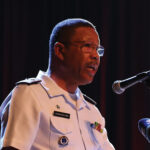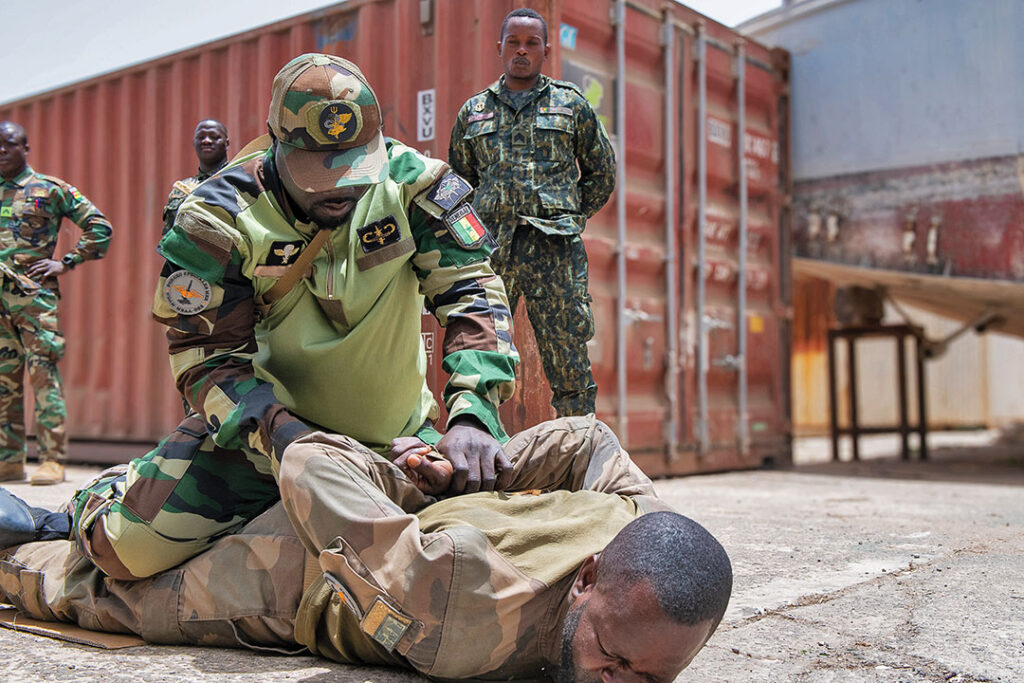 Rear Adm. António Duarte Monteiro, chief of staff of the Cabo Verdean Armed Forces, spoke in Praia on May 5, 2025, during the opening ceremony of the 14th iteration of Obangame Express, a multinational maritime exercise involving nations along the Gulf of Guinea. Cabo Verde hosted the exercise for the first time. Monteiro’s remarks have been edited for space and clarity.
Rear Adm. António Duarte Monteiro, chief of staff of the Cabo Verdean Armed Forces, spoke in Praia on May 5, 2025, during the opening ceremony of the 14th iteration of Obangame Express, a multinational maritime exercise involving nations along the Gulf of Guinea. Cabo Verde hosted the exercise for the first time. Monteiro’s remarks have been edited for space and clarity.
Despite the progress made in recent years, the security challenges faced in the Gulf of Guinea and mid-Atlantic regions have become increasingly multifaceted and interconnected. In addition to the well-known threats — such as piracy; narcotics, arms and human trafficking; illegal, unreported and unregulated fishing — new risks such as maritime cybercrime, illegal bunkering, illegal exploitation of underwater resources, and the growing use of unmanned technologies for illicit purposes have emerged. These threats, often orchestrated by sophisticated transnational networks, mandate a robust and structured response based on cooperative security, which requires coordination among multiple states and international organizations.
Within the regional and trans-Atlantic context, due to its geostrategic position in the mid-Atlantic, at the crossroads of major international maritime routes and its large exclusive economic zone, Cabo Verde faces significant security challenges. By adopting a holistic and integrated perspective on threats and the structuring of its national security framework, Cabo Verde has been working in close collaboration with its regional and international partners to ensure the protection and stability of our seas.
The Obangame Express exercise series, enriched by the contributions of partner countries and international organizations, has served as an invaluable platform for strengthening interoperability, sharing best practices and developing capabilities among participating nations, enabling them to confront the pressing challenges of the maritime sector, particularly in our region.
Obangame Express 2025, which takes place across the Gulf of Guinea, is not merely a demonstration of military capabilities nor solely an exchange of knowledge.
It also embodies a spirit of solidarity, a convergence of efforts, and above all, evidence to the power of unity among nations in pursuit of a common goal: contributing to peace and prosperity to ensure sustainable and balanced exploitation of living and nonliving resources.
Security-wise, we live in a world of constant changes, where the challenges and threats to maritime security are becoming increasingly complex and diffuse.
Furthermore, it is well known that maritime criminality and its perpetrators do not recognize and do not respect the delineation of geographical and political boundaries. This renders these transnational phenomena even more challenging, as the threats may have their origin on shore, in a distant country, materialized into crimes committed by means of another country, under the command of a third one, and perpetrated by citizens of other nationalities.
Thus, the need to cooperate regionally and internationally is fundamental to enhancing maritime security, and also the recommended path to confront transnational threats. The Yaoundé Code of Conduct remains a shining example of how countries in our region, in collaboration and cooperation with international partners, can work together to combat maritime crimes.
I am convinced that if we engage in dynamic regional and international cooperation, we will succeed in ensuring greater security in our maritime domain, a fundamental element for the development of our countries, subregions and continent, subsequently contributing to global security and stability.
It is, therefore, essential to optimize the capabilities of African maritime forces; enhance maritime situational awareness within our areas of jurisdiction; and promote interoperability, resilience, and operational readiness based on the principles of cooperation, knowledge sharing and joint training to ensure maritime security in its broadest sense.

